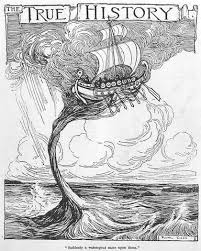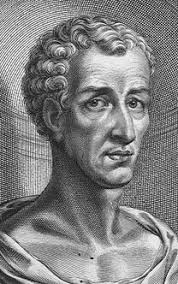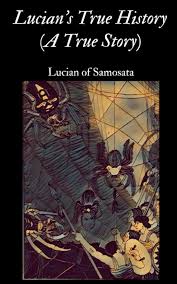Lucian, A True Story.
Good Reads meta-data is 90 pages, rated 3.5 by 4 litizens.
Genre: Fiction
DNA: Greco-Roman.
Verdict: Fake news.
Tagline: It’s all lies, and that is the truth!

‘Call me Luke’ (AD 125-180) was a geographic Syrian and Roman citizen who went west to fame and fortune, first as a visiting professor hither and yon, and then as a celebrity author. He was often ‘in conversation’ with local nobs, engaged in panel discussions, and spruiked his many books at personal appearances. Like most learned Romans of the time he spoke and wrote Greek, the language of international culture, as well as enough Latin to cash his appearance cheques.
Lucian’s story is true in that it is all lies, and he tells us from the get-go. Is he that logician’s specimen come to life, a lying Blackfoot? You be the judge!
In this autobiographical foray Luke takes off, literally, in search of a good time and willing ladies, with fifty other likely lads; together they sail through the pillars of Hercules to wild and woolly adventures on earth, on the sea, on the moon, among the stars, in the belly of 300 kilometre long whale, on an island of tree women, and more.
The sarcasm and satire are piled on. The main targets are earlier tellers of tall tales like Herodotus who reported every rumour as fact in the best tradition of the free press. Lucian outdoes them all in his fantasies. But he is lying as he happily reminds the reader.
He ends by promising a volume two, but that, too, was a lie.
It figures.

Of course then as now there were Good Readers who thought the lie was itself a lie and believed what he said to be true concealed behind that lie. Straussians avant le mot.
I got around to reading it because Thomas More with Desi Erasmus translated it from Greek to Latin, and published it in Florence (1519) in Machiavelli’s lifetime. I began to pick again at the thread that Machiavelli might then have been aware of More because he was a personal friend of the printer. Also because Lucian might have turned More’s mind to Utopia.

